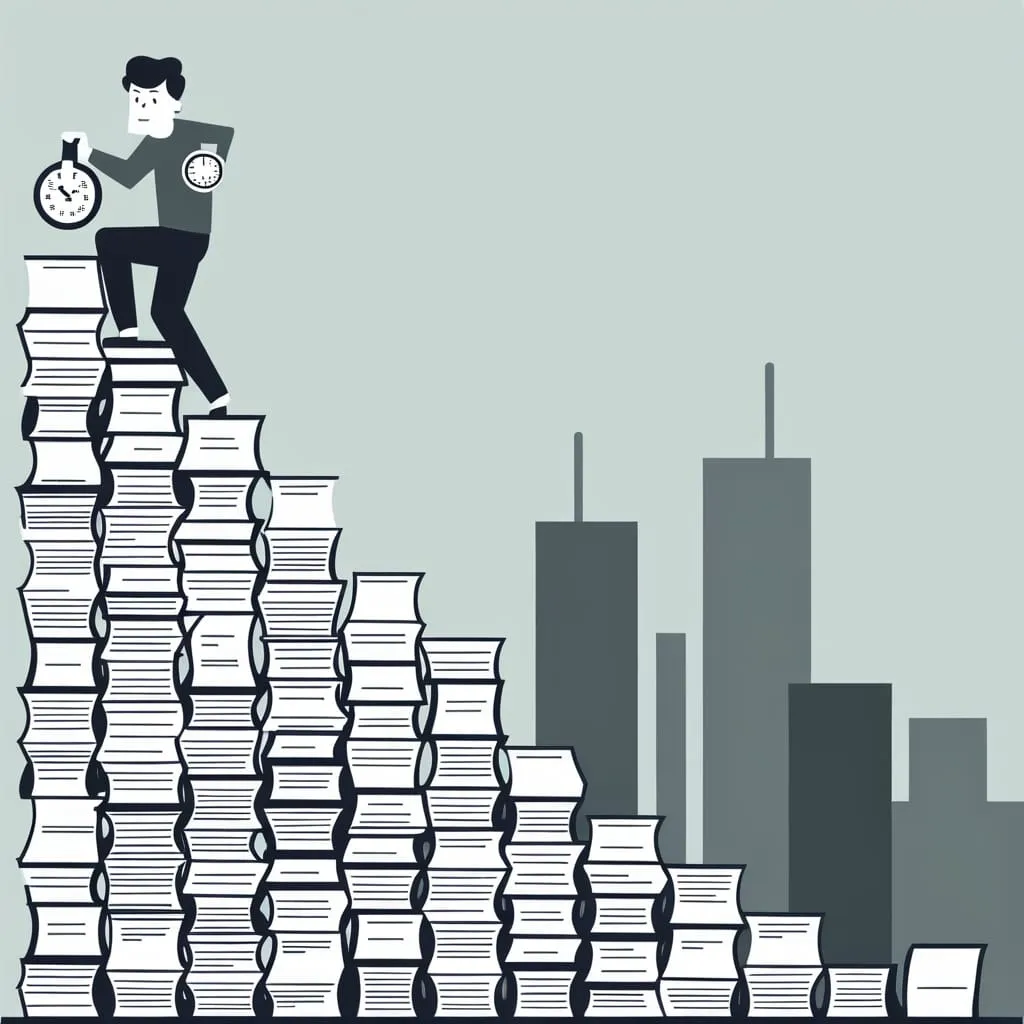Procrastination: The Silent Productivity Killer
We've all been there. That important financial report due tomorrow, the tax return that needs filing, or the budget plan you've been meaning to start. Yet, here you are, scrolling through social media or binge-watching your favorite show. Procrastination is a sneaky thief, robbing us of time, productivity, and peace of mind.
But don't worry, you're not alone in this struggle. Procrastination is a universal challenge that affects everyone, from students to CEOs. The good news? There are simple, effective ways to beat it and get stuff done.
Let's dive into some practical tricks to kick procrastination to the curb and boost your productivity, especially when it comes to those pesky financial tasks we all love to avoid.
Focus on the Journey, Not Just the Destination
One of the biggest reasons we procrastinate is because we get overwhelmed by the big picture. That financial report? It looks like Mount Everest when you're standing at the bottom. But here's a secret: you don't have to climb the whole mountain in one go.
Instead of fixating on the end result, shift your focus to the process. Break down that intimidating task into smaller, manageable steps. Don't think about writing the entire report. Just focus on writing the first paragraph or gathering the data you need. Your brain loves clear instructions and step-by-step processes. Give it what it wants!
Decision Fatigue: The Silent Energy Vampire
Ever noticed how you seem to have less willpower as the day goes on? That's decision fatigue in action. Every decision you make, no matter how small, chips away at your mental energy. By the time you get to that important financial task, your brain is exhausted from deciding what to wear, what to eat, and which email to answer first.
The solution? Reduce the number of decisions you need to make each day. Plan your day the night before. Lay out your clothes, decide on your meals, and set a specific time and place for tackling that financial task. When the time comes, you won't waste precious energy deciding what to do next.
The Magic of the 2-Minute Rule
Sometimes, the hardest part is just getting started. That's where the 2-Minute Rule comes in handy. The idea is simple: any new habit should take less than two minutes to start. It makes the initial step so easy, you can't help but take it.
Putting off organizing your financial documents? Start by simply opening the folder or picking up one document. That's it. Once you've begun, it's much easier to keep going. This rule works because it builds momentum and reinforces the identity you want to create for yourself—someone who gets things done.
Creating a Distraction-Free Zone
In today's world, distractions are everywhere. That ping from your phone, the endless scroll of social media, the colleague who always wants to chat. These distractions are kryptonite to your productivity.
To avoid procrastination, you need to create an environment that supports focus. Turn off your phone notifications, close unnecessary tabs on your computer, and find a quiet workspace. If you're working on a financial plan, consider using a tool to block social media sites or finding a quiet corner in your home where you can concentrate without interruptions.
Break It Down: The Power of Achievable Goals
When a task seems too big or overwhelming, it's easy to put it off. The key is to break it down into smaller, achievable goals. Working on a financial project? Divide it into smaller tasks like researching, drafting, and reviewing.
Try the Pomodoro Technique: set a timer for 20 minutes and focus on one task without any breaks. After the timer goes off, take a short break before diving back in. This technique can help you stay focused and make the task less daunting.
Facing the Procrastination Monster
The first step to overcoming any problem is admitting you have one. It's the same with procrastination. Recognize the patterns and reasons behind your procrastination. Are you afraid of failure? Are you overwhelmed by the task?
Once you acknowledge that you're procrastinating, you can start working on strategies to overcome it. If you find yourself constantly checking social media instead of working on your financial reports, admit this behavior to yourself and take steps to change it.
The Power of Accountability
Sometimes, we need a little external motivation to keep us on track. That's where accountability comes in. Join a study group or find a work buddy who can help keep you accountable.
When you know someone is counting on you to contribute, you're more likely to avoid procrastination. This sense of responsibility can be a strong driver for productivity, especially when it comes to tasks that feel solitary, like managing your finances.
Treat Yourself: The Importance of Rewards
Overcoming procrastination is a process, and it's important to celebrate your small victories along the way. Set up a reward system where you treat yourself after completing a task or reaching a milestone.
This could be something as simple as taking a walk, enjoying your favorite snack, or watching an episode of your favorite show. Rewards help reinforce positive behaviors and motivate you to continue working towards your goals.
Creating Your Productivity Haven
Your environment plays a huge role in your productivity. Choose a study or work location that's conducive to focus. Good lighting, minimal distractions, and enough space to spread out your materials are key.
Consistency is crucial here. Use the same location regularly so your brain associates it with work. If you're working on a financial budget, use a dedicated desk or table where you only do work-related activities. Your brain will start to associate that space with productivity.
The Power of Baby Steps
Procrastination often stems from feeling overwhelmed by the magnitude of a task. To overcome this, take small steps towards your goal. If you're putting off a financial task like organizing your receipts, start by sorting just one receipt.
Once you've taken that first step, you'll find it easier to continue. This approach helps build momentum and makes the task feel less daunting. Remember, every journey begins with a single step!
The Zeigarnik Effect: Your Brain's Natural Tendency
Have you ever noticed how unfinished tasks tend to stick in your mind? That's the Zeigarnik Effect at work. Your brain has a natural tendency to remember unfinished tasks better than completed ones.
You can use this to your advantage. If you're stuck on a financial problem, take a break and come back to it later. You might find that you've had a breakthrough or a new idea while you were away. Sometimes, stepping away from a task can actually help you come back to it with renewed energy and creativity.
Putting It All Together: A Real-Life Example
Let's say you're working on a financial report that's due soon, but you keep putting it off. Here's how you can apply these tricks:
First, focus on the process. Instead of worrying about completing the entire report, start by gathering the necessary data or writing the introduction. Reduce decision fatigue by deciding the exact time and place you'll work on the report the night before.
Use the 2-Minute Rule to get started. Open the report file or start by writing just one sentence. Find a quiet workspace, turn off your phone, and close unnecessary tabs to eliminate distractions.
Break the report into smaller tasks and set a timer for 20 minutes to focus on one task at a time. Recognize that you're procrastinating and take steps to change it. Share your deadline with a friend or colleague and ask them to check in on your progress.
Don't forget to reward yourself! Treat yourself to something nice after completing a significant portion of the report. Use a dedicated workspace where you only do work-related activities. And remember, start small. Begin by writing just one paragraph or sorting one piece of data.
The Road to Productivity
Beating procrastination isn't about being perfect. It's about taking small, consistent steps towards your goals. By focusing on the process, reducing decision fatigue, eliminating distractions, and using other strategies, you can create a more productive and fulfilling life.
Remember, every small step counts. It's the accumulation of these steps that leads to significant progress. So, the next time you find yourself procrastinating, try one of these tricks and see how it works for you.
Procrastination may be a tough opponent, but with these strategies in your toolkit, you're well-equipped to tackle it head-on. Your future self will thank you for the productive habits you're building today. Now, go conquer that to-do list!






